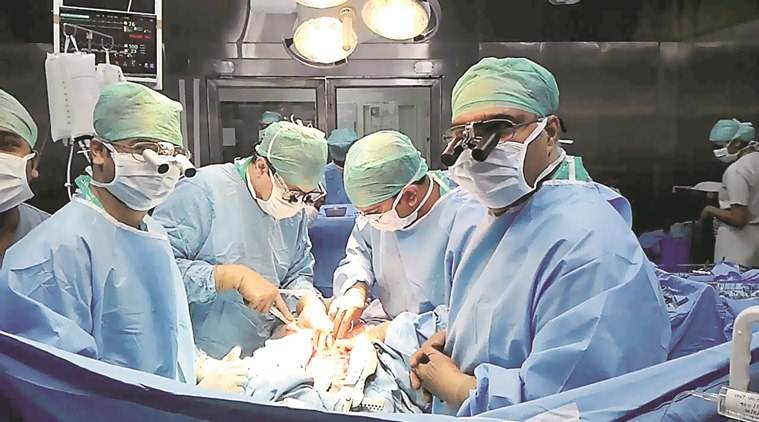 While hundreds of acts of violence against doctors have been reported every year for the past two decades, many more are never brought to light. (Representational)
While hundreds of acts of violence against doctors have been reported every year for the past two decades, many more are never brought to light. (Representational)
Doctors, nurses and healthcare professionals will remember the day the Union government passed an ordinance ensuring that acts of violence against doctors and other medical staff will be a cognisable and non-bailable offence. Imprisonment from six months to seven years and a penalty from Rs 50,000 to Rs 7 lakh can be sanctioned by the courts. Such punishments will serve as a deterrent to unruly patients and their relatives, if found guilty.
This ordinance has been precipitated by the precarious situation and the dire need for flawless health services during the COVID-19 pandemic. It is the result of the combined and timely efforts of several organisations and the leadership of the Indian Medical Association (IMA). Needless to say, any disruption of the health services would not only endanger the lives of hundreds of patients but could also raise questions on the ability of the government to rise to the occasion. Indeed, the prime minister, home minister and health minister have earned rich praise from the medical fraternity as they moved fast enough to assuage the medics who were hurt by the recent insults heaped on them by the society, including stopping of burying the bodies of their deceased colleagues.
There are, however, some major caveats to be kept in mind. The ordinance has been brought as an amendment to the Epidemic Diseases Act, 1897, and hence, may become infructuous after the pandemic is declared over. We do hope that the pandemic dies down at the earliest, but want an assurance that the ordinance will remain in force.
In the times of COVID, healthcare professionals (HCPs) are reaching out to do tests, diagnose and treat the infected and sick, despite the risks. The society, due to obvious fears, often insults these dedicated warriors. Even in the past, nearly every doctor has faced verbal abuse and nasty cryptic remarks, more so in India than other parts of the world. The common causes in government hospitals are the delay in appointments, queues for tests and several painful days before the treatment begins. In the private set-up, there are also the costs and limitless demands of paying patients. Doctors often face pressure tactics, accusations of incorrect diagnosis and wrong prescriptions (these could be due to differences in assessment and judgement).
All this could be related to deteriorating civic sense and poor implementation of laws. There is also the possibility of poor communication by the doctors. However, physical abuse and violence against doctors at their place of work is unacceptable. Vandalising of personal and hospital assets has increased exponentially recently. Fears of personal safety, assault on their family and false litigations, intimidates doctors, making them too scared to take proper decisions. They often end up in doing either more tests or referring such patients to another centre.
While hundreds of acts of violence against doctors have been reported every year for the past two decades, many more are never brought to light. The youngest professionals — resident doctors on emergency duty — end up seeing dozens of patients in one night. Few appreciate this. It is possible that in some instances, there may be a delay in arriving at a proper diagnosis and initiating treatment due to the complexities of the disease per se. But this is never intentional.
While we salute the acknowledgment by the government of the unprecedented challenges faced by doctors, it needs to be seen how the doctors or their lawyer will be able to prove that the accused had a guilty intent (mens rea) and was performing an illegal act (actus reus). The enactment of a law is unlikely to curb the near-criminal acts by patients or their attendants. The public at large needs to appreciate that what they are doing is illegal and inhuman. There is a need to educate society that healthcare professionals genuinely do their best. They have no malice, nor do they intend to do any harm. The public has also to be educated on the complexities of decision-making in complex cases.
Whenever the doctors ask for protection or raise their voice against the violence, their demands are hardly given attention — the fraternity is reminded of the nobleness of the medical profession and the Hippocratic Oath. The remedial altars, the courts, direct them not to protest and return to work. To be beaten again! Court after court, judgment after judgment, has given large compensations to the plaintiffs for alleged medical negligence.
Will the courts change their outlook in the wake of the new ordinance? If these very warriors are ostracised while returning from work or are thrown out of their houses, bruised by a crowd pelting stones, will the courts and judges rise to the occasion and take suo-moto action? Will they be able to deliver timely and exemplary punishments and safeguard the dignity and lives of HCPs? Healthcare professionals need a sensitive and accountable judicial system and this ordinance should be given more punch and wider applicability in the times to come.
The new ordinance has to be weighed in light of these facts and will only achieve the desired results if the society at large appreciates the challenges and pains faced by HCPs. Alas, what was the genuine due of the doctors and HCPs — the tribute and the respect — has come through the law. So be it. Let the hands not waver while delivering judgments.
The writer is director, Institute of Liver and Biliary Sciences, Delhi. He heads the expert panel constituted by Delhi government to tackle coronavirus, Views are personal
This article first appeared in print under the headline The Safety of Healers